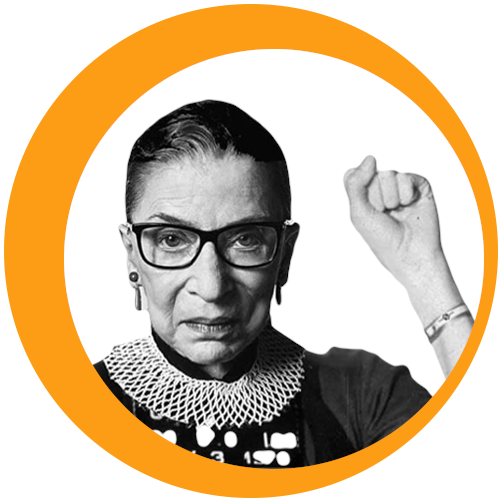“There is a need to look with special suspicion at any law that disadvantages a group of people, especially when those people are not proportionately represented in legislative decision making or executive decision making.”
Ruth Bader Ginsburg
28. April 2017 Georgetown University, April 28, 2017
(from 300 Statements der berühmten Supreme Court Richterin, S. 35)
Response to a student’S question

Background Information
Discriminatory laws are unfortunately not uncommon. The laws on official attire in several federal states prohibit religious dress or imply that it inherently compromises neutrality. The premise that religious attire is inherently incompatible with neutrality must be categorically rejected. Here are some examples of such problematic regulations in the judiciary:
In Baden-Württemberg
§ 21 AGGVG
Official attire, neutrality
(1) Professional judges, commercial judges, representatives of the public prosecutor’s office, persons who perform the duties of a judicial officer incumbent upon them or assigned to them, and clerks of the court’s office shall wear official attire at the court sessions convened for the purpose of hearing a case or pronouncing a decision, unless the court is of the opinion that in individual cases a different arrangement is required in the interest of finding justice. For other judicial acts as well as for hearings outside the courtroom, the official attire shall be worn if this appears appropriate with regard to the reputation of the administration of justice; the decision on this shall be taken by the court.
(2) The Ministry of Justice may, by statutory order
- extend the obligation under subsection 1 to other persons who are authorised to appear as authorised representatives, advisers or defence counsels before the court,
- allow exceptions from the obligation under paragraph 1,
- determine the nature and form of the official attire.
(3) Any person who performs judicial or public prosecutorial duties incumbent upon or assigned to them at a hearing or in official acts outside a hearing at which participants, witnesses or experts are present may not wear any symbols or items of clothing which, when viewed objectively, express a particular religious, ideological or political view. The special prohibition according to the first sentence shall not apply to lay assessors and other honorary judges.
(4) Paragraphs 1 and 2 shall also apply in proceedings before the courts in bar cases, the magistrates’ service courts and in proceedings assigned to the Regional Court or Higher Regional Court under the Federal Code of Notaries or the Tax Consultancy Act, and shall also cover honorary judges in these proceedings. Paragraph 3 sentence 1 shall also apply to professional judges in the proceedings pursuant to sentence 1.
In Bavaria
Art. 11 BayRiStAG
Official attire, neutrality
(1) Judges, public prosecutors and state public prosecutors shall wear official attire as determined by the highest administrative authority.
(2) 1 Judges may not wear any visible religious or ideological symbols or items of clothing that could cast doubt on their independence, neutrality or exclusive adherence to the law in hearings or in any other official public acts. 2 Sentence 1 shall apply accordingly to public prosecutors and state public prosecutors. 3Further-reaching provisions shall remain unaffected.
In Hesse
§ 45 HBG
1 Civil servants must behave in a politically, ideologically and religiously neutral manner in the course of their duties. 2 In particular, they may not wear or use items of clothing, symbols or other signs which are objectively likely to impair confidence in the neutrality of their official conduct or to endanger political, religious or ideological peace. 3 When deciding on the fulfilment of the requirements according to sentences 1 and 2, due consideration shall be given to the Christian and humanistic Western tradition of the State of Hesse.
In Lower Saxony
§ 31a NJG
Any person who performs judicial or public prosecutorial duties incumbent upon them or assigned to them at a hearing or at another official act at which participants, witnesses, experts or listeners are present may not wear any visible symbols or items of clothing that express a religious, ideological or political conviction.
In North Rhine-Westphalia
§2 JNeutG NRW
Prohibition of religious, ideological or political symbols and clothing
(1) Employees and honorary judges may not wear any perceptible symbols or items of clothing during court proceedings which, when viewed objectively, express a particular religious, ideological or political view.
(2) Even outside court hearings, employees may not wear symbols or items of clothing of the type referred to in paragraph 1 when carrying out the sovereign activities assigned to them, if they are regularly seen by third parties during these activities.

